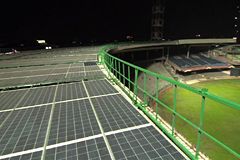Solar energy powers cricket stadium

A 400 kW rooftop photovoltaic system meets around one third of the annual electricity needs of a cricket stadium in the south of India.
Cricket is the national sport in India. Spectators' keen interest in this sport also provides an excellent opportunity to raise awareness about environmentally-friendly power generation. By installing a photovoltaic system on the roof of the Chinnaswamy Stadium in Bangalore, the Karnataka State Cricket Association (KSCA) is able to demonstrate that environmental awareness and economic efficiency can be reconciled with great success.
The system is one of the first large-scale solar PV rooftop power systems in the Indian Region of Karnataka. It comprises 1,422 modules, has a capacity of 400 kW and was built in April this year by the Indian company MRO-TEK. Based on an annual average, it has the potential to meet around one third of the stadium's electricity needs. When there is prolonged sunshine - that is, during peak periods - surplus generated electricity can even be fed into the grid of the Bangalore Electricity Supply Company Ltd. (BESCOM) via a net metering system. According to representatives of MRO-TEK, the plant is set to become profitable after just four years.
The technical and economic feasibility were supported by the International Climate Initiative (IKI) of the German Federal Environment Ministry (BMUB) as part of a project entitled 'Commercialization of Solar Energy in Urban and Industrial Areas in India (ComSolar)'. The project is being implemented by the Deutsche Gesellschaft für Internationale Zusammenarbeit (GIZ) GmbH and is part of the Indo-German Energy Programme (IGEN). The political partners of ComSolar are the Government of India and its Ministry of New and Renewable Energy (MNRE). The programme is also supporting a number of other activities, including the Jawaharlal Nehru National Solar Mission, which is part of India's National Action Plan on Climate Change. The Mission has set itself the target of installing 100 GW of solar energy capacity by 2022.
In cooperation with the ComSolar IKI project, the KSCA is planning to gradually convert the stadium into a 'green stadium'. The corresponding "Green Wicket" concept was developed by the IKI project ComSolar in cooperation with the Indo-Germanic Environment Partnership Programme (IGEP).This process entails increasing the capacity of the photovoltaic system by adding another 850 kW, introducing a waste management system, and collecting and using rainwater.
The link has been copied to the clipboard
Contact
IKI Office
Zukunft – Umwelt – Gesellschaft (ZUG) gGmbH
Stresemannstraße 69-71
10963 Berlin














